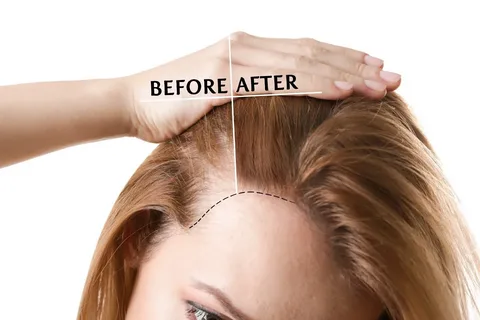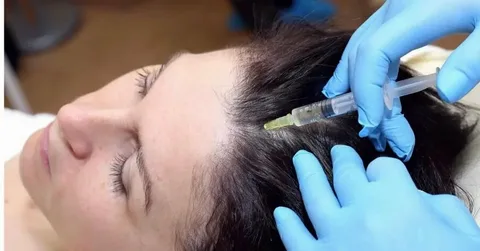Progesterone for Hair Regrowth: Does It Really Work?
 Fariha Nadeem
Fariha NadeemStruggling with hair thinning and searching for effective treatments? Progesterone for Hair Regrowth: Does It Really Work? Explores the potential of progesterone in stimulating hair growth and preventing further loss.
This guide offers clear insights into how progesterone influences hair follicles, its benefits, and expert-backed solutions to help you decide if it’s right for you.

Backed by medical research, it empowers you with
trusted information to take control of your hair health and achieve fuller, healthier hair.
READ MORE: Eyebrow Transplant for Men: Everything You Need to Know
Progesterone for Hair Regrowth: Does It Really Work?
Progesterone is a naturally occurring hormone primarily involved in the menstrual cycle and pregnancy. It is sometimes discussed in relation to hair loss because hormones influence hair growth cycles. However, its direct effect on hair regrowth is complex and not fully established.
How Progesterone Is Thought to Affect Hair
Hormonal Balance: Progesterone may counteract the effects of androgens (male hormones) like DHT (dihydrotestosterone), which contribute to androgenic alopecia (pattern hair loss).
Scalp Health: Some studies suggest progesterone could improve scalp conditions by modulating inflammation or hormone receptor activity.
Scientific Evidence and Limitations
Current clinical evidence supporting progesterone as a standalone treatment for hair regrowth is limited and inconclusive. It is not widely used as a primary therapy in hair restoration.
Comprehensive Hair Restoration Services at Dr. Rana Irfan’s Clinic
Our clinic in Islamabad offers advanced treatment options tailored to individual needs, including:
Surgical Procedures
Follicular Unit Extraction (FUE): A minimally invasive hair transplant technique with natural-looking results and minimal scarring.
Follicular Unit Transplantation (FUT): Suitable for patients requiring larger graft numbers.
Non-Surgical Treatments
Platelet-Rich Plasma (PRP) Therapy: Stimulates hair follicles through growth factors.
Medical Therapies: Minoxidil, finasteride, and hormone modulation under expert supervision.
While progesterone is occasionally considered in hormonal therapy plans, it is typically combined with other treatments rather than used alone.

**
Benefits and Considerations of Hormonal Treatments**
Potential Benefits
May support hormonal balance affecting hair loss.
It could complement other treatments to improve scalp health.
Important Considerations
Hormonal therapies must be prescribed and monitored by experienced specialists.
Effects vary widely among individuals.
Not a substitute for surgical options in advanced hair loss cases.
Treatment Process and Patient Care at Our Islamabad Clinic
Consultation and Diagnosis: In-depth evaluation including scalp examination and medical history.
Personalized Treatment Plan: Combining surgical, non-surgical, and hormonal options as appropriate.
Procedure and Follow-up: Detailed care and monitoring to maximize hair restoration success.
Recovery times vary depending on the procedure, but are generally designed to fit patient lifestyles with minimal downtime.
Pricing Overview
Costs depend on treatment type and the extent of hair loss. Our Islamabad clinic provides customized pricing after a thorough assessment to ensure transparent and fair options.
Ideal Candidates for Hormonal and Hair Restoration Treatments
Individuals experiencing early-stage hair thinning.
Patients are interested in combined therapies for enhanced results.
Candidates for hair transplant surgery with a stable donor hair supply.
Related Services
Subscribe to my newsletter
Read articles from Fariha Nadeem directly inside your inbox. Subscribe to the newsletter, and don't miss out.
Written by
